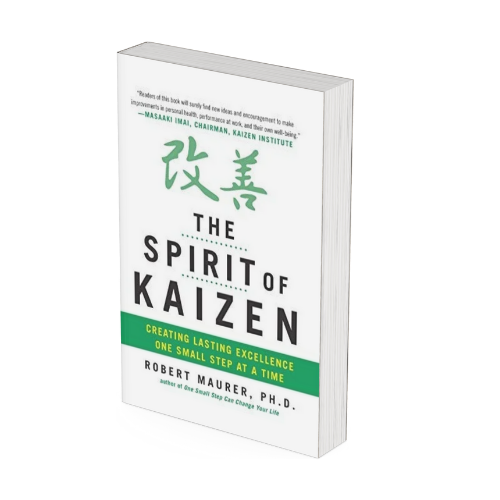The Spirit of Kaizen: Creating Lasting Excellence, One small step at a time
by Bob Maurer and Leigh Ann Hirschman
The Author
Dr. Robert Maurer is a clinical psychologist who specialises in applying the Japanese philosophy of Kaizen to assist long-term change in personal and professional contexts.
As a consultant for firms such as Walt Disney Studios and Costco, Maurer has assisted numerous organisations and individuals in taking tiny, controllable steps towards significant transformation.
Co-author Leigh Ann Hirschman is a writer passionate about making complex subjects understandable and engaging, and she has helped bring Maurer’s insights to people worldwide.
Summary of The Spirit of Kaizen
The Spirit of Kaizen introduces readers to the concept of Kaizen—”continuous improvement”—which originated in Japanese manufacturing and demonstrates how it may help modify personal and professional behaviours.
The authors, Maurer and Hirschman, argue for change in tiny, sustainable stages rather than significant, sweeping upheavals. Focusing on achievable changes teaches readers to form new, long-term habits that reduce stress, overcome anxiety, and promote steady growth.
The book’s methodology is based on the psychology of change. According to Maurer, tiny, focused steps help people avoid the brain’s resistance to massive changes, resulting in a slow but consistent alteration of routines, mindsets, and productivity levels.
The Spirit of Kaizen equips readers with skills to implement this idea in all aspects of their lives, whether they desire to develop better personal habits or foster a more productive workplace.
The authors’ message is straightforward: living a life of continuous development does not necessitate extreme changes or significant overhauls; rather, it entails making little effort, on a regular and consistent basis, to create real, long-term improvements.
My Thoughts on The Spirit of Kaizen
The Spirit of Kaizen stands out because it is practical and based on genuine psychology rather than hype. It’s not about changing everything overnight but developing better habits in small, manageable increments. Maurer’s “small steps” concept is consistent with my experience as a coach and therapist.
Many of us, particularly those who work with people experiencing stress or behavioural challenges, have witnessed how difficult it can be for people to make adjustments when they are coping with complex life circumstances. This book recommends a more straightforward approach.
As a team leader at Willingness, I’ve used Kaizen’s ideas in my personal life and our company’s operations and culture. The impact has been incredible. Willingness applies Kaizen concepts to all aspects of our business, from team meetings to client feedback.
Every week, our team meets to examine what went well, where we can improve, and how we can make tiny, consistent improvements that benefit our clients and ourselves. This weekly practice of gradual improvement has increased client happiness and boosted team morale.
We notice a significant difference in how we work together and the quality of care we deliver when we focus on attainable, frequent improvements rather than perfection or large-scale adjustments.
Our clients constantly tell us that they feel understood and supported because we listen to their needs and implement their input. This system also keeps our team focused and motivated.
Knowing that even tiny efforts contribute to positive change boosts confidence, decreases fatigue, and improves overall team satisfaction. Maurer and Hirschman’s Kaizen strategy has been transformative for us, helping us foster a continuous improvement culture that benefits everyone involved.
I urge clients and coworkers to apply the lessons learnt from The Spirit of Kaizen.
- Embrace continuous improvement: At Willingness, we’ve witnessed firsthand how modest improvements may significantly impact. This applies to every setting: support tiny, steady moves towards long-term progress.
- Increase Team Engagement and Morale: Consistent, achievable modifications make everyone feel important and less stressed. This strategy can help build a positive company culture.
- Value Client and Peer Feedback: Kaizen emphasises feedback and reflection, which are crucial practices for every firm. Regular feedback sessions increase service quality and foster stronger customer relationships.
- Set Small, Achievable Goals: Encourage breaking down larger goals into manageable segments. These tiny goals help customers stay focused and motivated and lessen their fear of change.
- Overcome Resistance to Change: The Kaizen technique reduces fear of change. Introducing tiny stages reduces the brain’s inherent resistance, promoting gradual transformation.
- Recognise and applaud modest progress: This boosts confidence and perpetuates the sound effects of progress, both in personal and team situations.
- Encourage Regular Reflection: Consistent reflection, such as our weekly feedback sessions, reinforces a growth mentality and keeps everyone involved in the self-improvement process.
- Maintain Consistency and Patience: Change does not have to be radical; consistency over time is more durable. This is one of Kaizen’s primary strengths and is beneficial for anyone looking to develop long-term habits.
In Summary
The Spirit of Kaizen emphasises the need for tiny, consistent activities to achieve long-term benefits.
Implementing these principles at Willingness has enhanced team satisfaction and strengthened client relationships, demonstrating that consistent, intentional modifications can result in substantial change.
The Spirit of Kaizen: Creating Lasting Excellence, One small step at a time
by Bob Maurer and Leigh Ann Hirschman
The Author
Dr. Robert Maurer is a clinical psychologist who specialises in applying the Japanese philosophy of Kaizen to assist long-term change in personal and professional contexts.
As a consultant for firms such as Walt Disney Studios and Costco, Maurer has assisted numerous organisations and individuals in taking tiny, controllable steps towards significant transformation.
Co-author Leigh Ann Hirschman is a writer passionate about making complex subjects understandable and engaging, and she has helped bring Maurer’s insights to people worldwide.
Summary of The Spirit of Kaizen
The Spirit of Kaizen introduces readers to the concept of Kaizen—”continuous improvement”—which originated in Japanese manufacturing and demonstrates how it may help modify personal and professional behaviours.
The authors, Maurer and Hirschman, argue for change in tiny, sustainable stages rather than significant, sweeping upheavals. Focusing on achievable changes teaches readers to form new, long-term habits that reduce stress, overcome anxiety, and promote steady growth.
The book’s methodology is based on the psychology of change. According to Maurer, tiny, focused steps help people avoid the brain’s resistance to massive changes, resulting in a slow but consistent alteration of routines, mindsets, and productivity levels.
The Spirit of Kaizen equips readers with skills to implement this idea in all aspects of their lives, whether they desire to develop better personal habits or foster a more productive workplace.
The authors’ message is straightforward: living a life of continuous development does not necessitate extreme changes or significant overhauls; rather, it entails making little effort, on a regular and consistent basis, to create real, long-term improvements.
My Thoughts on The Spirit of Kaizen
The Spirit of Kaizen stands out because it is practical and based on genuine psychology rather than hype. It’s not about changing everything overnight but developing better habits in small, manageable increments. Maurer’s “small steps” concept is consistent with my experience as a coach and therapist.
Many of us, particularly those who work with people experiencing stress or behavioural challenges, have witnessed how difficult it can be for people to make adjustments when they are coping with complex life circumstances. This book recommends a more straightforward approach.
As a team leader at Willingness, I’ve used Kaizen’s ideas in my personal life and our company’s operations and culture. The impact has been incredible. Willingness applies Kaizen concepts to all aspects of our business, from team meetings to client feedback.
Every week, our team meets to examine what went well, where we can improve, and how we can make tiny, consistent improvements that benefit our clients and ourselves. This weekly practice of gradual improvement has increased client happiness and boosted team morale.
We notice a significant difference in how we work together and the quality of care we deliver when we focus on attainable, frequent improvements rather than perfection or large-scale adjustments.
Our clients constantly tell us that they feel understood and supported because we listen to their needs and implement their input. This system also keeps our team focused and motivated.
Knowing that even tiny efforts contribute to positive change boosts confidence, decreases fatigue, and improves overall team satisfaction. Maurer and Hirschman’s Kaizen strategy has been transformative for us, helping us foster a continuous improvement culture that benefits everyone involved.
I urge clients and coworkers to apply the lessons learnt from The Spirit of Kaizen.
- Embrace continuous improvement: At Willingness, we’ve witnessed firsthand how modest improvements may significantly impact. This applies to every setting: support tiny, steady moves towards long-term progress.
- Increase Team Engagement and Morale: Consistent, achievable modifications make everyone feel important and less stressed. This strategy can help build a positive company culture.
- Value Client and Peer Feedback: Kaizen emphasises feedback and reflection, which are crucial practices for every firm. Regular feedback sessions increase service quality and foster stronger customer relationships.
- Set Small, Achievable Goals: Encourage breaking down larger goals into manageable segments. These tiny goals help customers stay focused and motivated and lessen their fear of change.
- Overcome Resistance to Change: The Kaizen technique reduces fear of change. Introducing tiny stages reduces the brain’s inherent resistance, promoting gradual transformation.
- Recognise and applaud modest progress: This boosts confidence and perpetuates the sound effects of progress, both in personal and team situations.
- Encourage Regular Reflection: Consistent reflection, such as our weekly feedback sessions, reinforces a growth mentality and keeps everyone involved in the self-improvement process.
- Maintain Consistency and Patience: Change does not have to be radical; consistency over time is more durable. This is one of Kaizen’s primary strengths and is beneficial for anyone looking to develop long-term habits.
In Summary
The Spirit of Kaizen emphasises the need for tiny, consistent activities to achieve long-term benefits.
Implementing these principles at Willingness has enhanced team satisfaction and strengthened client relationships, demonstrating that consistent, intentional modifications can result in substantial change.
“A man becomes a man when a man is needed. I’ve seen 40-year-old children cause a man was never needed”
Recent Thoughts
When Love Turns to Hate: Why Justice Must Stay in the Courtroom and Not Online
As a therapist working closely with couples and individuals in high-conflict relationships, I have seen the full emotional arc of love, from intimacy
Stress at the Top
Why Leadership in Malta is More Isolated Than You Think We often picture business leaders as confident, driven, and in control. They make




